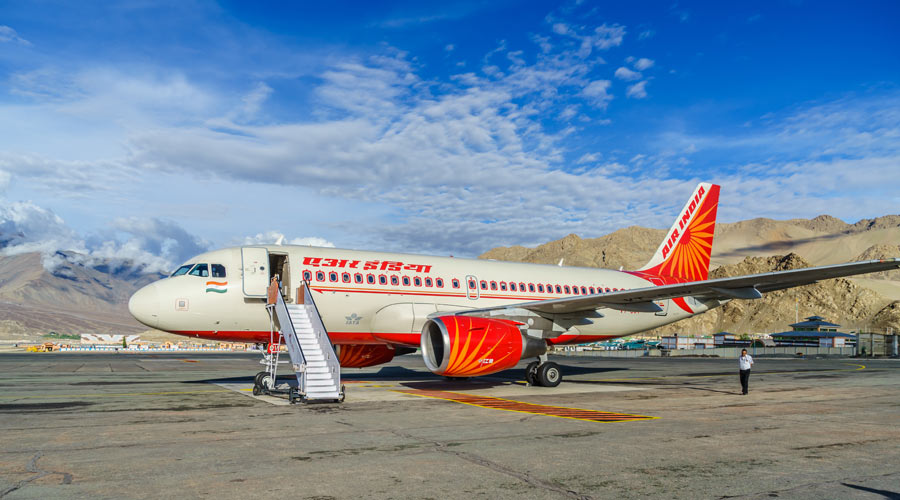Take flight
Sir — The takeover of the habitually loss-making airline, Air India, by the Tatas is one of their boldest steps, especially considering the overall gloom pervading the aviation sector (“Welcome back”, Oct 12). There are many challenges to restoring Air India’s past glory — an image makeover, bringing about a change in the mindset of employees, lowering the operating costs.
Now the Tatas have four aviation brands: two low-cost carriers — Air India Express and AirAsia India — and two full-service airlines — Air India and Vistara. Not all of these have an impressive record. But Air India does have trained pilots and crew, prized slots at airports both at home and abroad as well as a fleet of over 130 planes. The Tatas could use these assets to consolidate their position in the aviation sector. The fact that all employees must be retained for at least a year might make the training of staff difficult. But given the Tatas’ experience in running big organizations, this is not impossible.
This deal may open up the floodgates of disinvestment or majority or even complete takeover by private players of loss-making government undertakings. It might,
thus, help reduce the burgeoning debt burden of the country.
Chanchal Nandy,
West Burdwan
Sir — The history of Air India came full circle with the Tata group emerging as the winning bidder for India’s premier carrier. This is an occasion for the employees, patrons as well as the public to rejoice. J.R.D. Tata, the first licensed pilot of India and pioneer of the Indian aviation industry, had launched Tata Airlines in 1932. Later listed as Air India, it was nationalized in 1953.
In the wake of its merger with Indian Airlines, things started going downhill for the national carrier, with losses mounting each year. Eventually, the government decided in favour of a disinvestment. Now that the Tatas have got it back, they will hopefully bring back the glory days for Air India with their experience in the industry. A new horizon of hope is expected to open up before the 12,000 Air India employees whose future, until now, hung in the balance.
Tapash Chatterjee,
New Barrackpore
Sir — It was heartening that the Tata group emerged as the highest bidder for Air India. On account of the faulty policies of the government, the airline caved in to competition from private airlines. Further, the aviation industry globally faced significant losses — $314 billion — owing to the pandemic. As such, the Tatas have set a positive example by acquiring the airline with a debt of Rs 61,562 crore. This is praiseworthy.
Jayanta Datta,
Hooghly
At long last
Sir — The development of the long-awaited and much-needed anti-malaria vaccine is a major breakthrough in medical science. The RTS,S/AS01, developed by the British pharmaceutical company, GlaxoSmithKline, is sold as Mosquirox. Approved by the World Health Organization and recommended for widespread use among children, it holds out the hope of saving millions of lives.
Although the vaccine has shown limited efficacy until now — it prevents 39 per cent of malaria cases and 29 per cent of severe malaria cases — it can prove to be beneficial. One study found that when children were given both RTS, S and anti-malarial drugs, there was a 70 per cent reduction in hospitalization and death. Malaria has been a scourge for millennia; claiming innumerable lives, especially in sub-Saharan Africa. It poses a serious threat to India as well. It will take a lot of political will and funding to roll out the vaccine from the lab to the field. The global vaccine alliance, Gavi, should step in.
G. David Milton,
Maruthancode, Tamil Nadu
Sir — Good news has finally arrived with the WHO approving the RTS, S malaria vaccine. Its development has taken over 40 years. Malaria claims around four lakh
lives every year. The situation is worst in sub-Saharan Africa; the new vaccine should be able to help the people there.
Mankind’s struggle against diseases seems unending. By the time we are able to contain one disease, a new one emerges. If only more research on knowledge science were devoted to healthcare — some countries focus on creating bioweapons instead — our struggle with diseases would not have been so one-sided.
Jang Bahadur Singh,
Jamshedpur
Different game
Sir — Following the findings of a survey across seven countries, the toy-manufacturing company, Lego, has promised to make its products “free of gender bias and harmful stereotypes” by shifting the focus to “passions and interests”. This is indeed a positive step. However, one cannot help but doubt the actual motivation behind this decision. The fact that children are affected by gender roles normalized through playthings is not new. In fact, other toy companies — Mattel and its gender-neutral and progressive Barbie models, for example — have already shown the way. Is this, then, merely a marketing tactic to increase sales by earning people’s trust?
Adrita Bhowmick,
Calcutta











